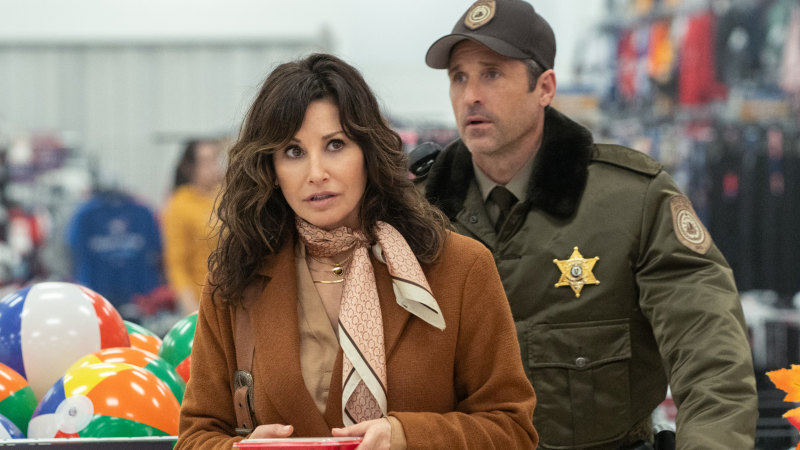By Robert Moran
Save articles for later
Add articles to your saved list and come back to them any time.
It was 16 years ago that horror filmmaker Eli Roth first introduced the world to his slasher vision Thanksgiving (tagline: “There will be no leftovers”), inspired by the seasonal horror films of his ’70s and ’80s youth such as Halloween (1978), My Bloody Valentine (1981) and Silent Night, Deadly Night (1984). That was as a spoof movie trailer in the middle of Grindhouse, Quentin Tarantino and Robert Rodriguez’s pulpy 2007 double-feature, where an axe-wielding pilgrim wreaked havoc on lusty teenagers around the backwoods of Plymouth, Massachusetts.
“[Co-writer] Jeff Rendell and I, we grew up in Massachusetts, which is the birthplace of Thanksgiving; it’s a huge deal there and in school it’s really shoved down your throat – you go to these pilgrim recreation villages, there’s a school play, a parade…” Roth explains. “So growing up we always thought, ‘Why isn’t there a Thanksgiving slasher film?’ Grindhouse gave us the opportunity to try out all the kills we’d already had floating around in our heads.”
A pilgrim-inspired killer terrorises Plymouth, Massachusetts in Thanksgiving – his name is John Carver.
Over the years, the resulting trailer – campy and explicit and horrific as it was – came to be touted by genre aficionados as “the best horror movie never made”. Well, until now. “It’s really down to the fans, badgering me year after year,” Roth jokes of how Thanksgiving came to be a real movie. “Guilt-tripping and shaming me, it really works.”
In a metatextual flip that cheekily ribs Hollywood’s predictability, this Thanksgiving is framed as a modern-day reboot of the lost slasher film that was featured in the fake movie trailer. There’s a killer on the loose in modern-day Plymouth, and he’s got an axe, a wrath and a creepy mask of the first US settlement’s first governor. Wonderfully, his name was John Carver. “I mean, when history hands you a gift like that, how do you not use it?” jokes Roth. “It’s a perfect slasher villain name and he was real, the governor on the Mayflower!”
Despite Thanksgiving Day’s heavy baggage (like Australia Day, many in the US have increasingly questioned the holiday’s ties to colonial aggression), the film’s key creative breakthrough for Roth and Rendell came from something decidedly more contemporary: watching online “trample videos” from Black Friday shopping sales, traditionally held the day after Thanksgiving, that started proliferating on social media around a decade ago with news reports and clips of shoppers in a consumerist frenzy.
“These Black Friday sales, they were never a thing when I was a kid. But now I know they’re even in Australia, they’re everywhere,” says Roth, who saw fertile horror territory in the holiday’s materialistic shift. “The whole idea of Thanksgiving is you’re supposed to be thankful for what you have and for your health, but then you just go out and kill your neighbour for a waffle iron.”
That idea gives the film its raucous opening, what might be the most horribly enjoyable 13 minutes of a film all year – a sick and clever movement that launches the film’s action amid the craze of a Black Friday sale. In the great tradition of seasonal horror classics, the move lets Roth critique the gross commercialisation of the holiday, tap into our era’s increasingly stoked class divisions, and evoke the horror genre’s rich legacy: the hordes of rampaging shoppers rushing the shopping mall feel like a direct nod to George Romero’s classic anti-capitalist screed, Dawn of the Dead (1978).
Gina Gershon and Patrick Dempsey in Thanksgiving.
“I love Dawn of the Dead, zombies running the mall, and very much in line with Romero’s views on consumerism run amok. That’s what it’s all about. There’s a real darkness underneath it and it’s not just people’s greed that’s behind [the frenzy of these] Black Friday sales,” says Roth.
“People are paid shit now so there’s no middle class any more so they desperately need these Black Friday sales in order to get all the Christmas gifts for their kids, otherwise they can’t afford them. So then you have the very few at the top sitting in their mansions watching all the rats fighting over these crumbs, and there’s something really sick about that, that everyone’s been reduced to fighting for televisions and electronics because the only way they can afford them is on this one sale day, while the few at the top get richer and richer.”
Horror, the genre – even among films built on flimsier precepts than Thanksgiving – has a long history of reflecting the tumult and anxieties of the wider culture in which they were created. The opening scenes of crazed shoppers pressed up against the jagged glass of the mall also evokes images from the US’s January 6 riots, while later scenes in which armed school students are anxiously and awkwardly forced to defend themselves against a crazed killer feel like they’re engaging with the US’s feverish gun control rhetoric. When I question Roth about the symbolism, he spiritually, if not literally, rolls his eyes.
Director Eli Roth sees franchise potential in his remarkably fun new slasher flick.
“Look, I want it to be where we’re in the world of the movie, we’re not in the real world. I want people to escape into a rollercoaster ride and have a fun time with the movie. But certainly, if you want to write a film school thesis about it, everything’s there,” he says. For such a horror tragic, the first goal is always “great kills”.
“Every time I make a horror movie, it’s like a badge of honour for me,” says Roth. “It’s like, this is my chance to make a slasher film, you know? I grew up with Freddie, Jason, Michael Myers, Chucky – I loved those movies so much – and in the ’90s, we had Ghostface and other slashers that were overlooked, like Mute Witness (1995) which is one of my favourites. I just thought, well, it’s time for a new slasher. I want a new killer in town, so let’s create another one.”
Roth has been horror’s most provocative maestro for decades now, a filmmaker who finds a sinister glee in pushing the envelope – it was his film Hostel (2005), after all, that spawned the term “torture porn”. In a weak glimmer at the back of my mind, I vaguely remember attending a Q&A screening for Cabin Fever (2002), Roth’s then feature debut, at Glebe’s now defunct Valhalla cinema about 20 years ago.
“Oh, I remember that,” Roth recalls. “I remember a kid coming up to me after, with his friend Angus, and we talked for half an hour about how much he loved the movie. And I was doing Angus’ radio show the next day and that kid came up to me again and he’s like, ‘Yeah, I made a short film called Saw.’ It was Leigh Whannell.”
(L to R) Tomaso Sanelli, Nell Verlaque, Addison Rae, Gabriel Davenport and Jenna Warren, in trouble in Thanksgiving.
Roth has since helmed over 20 films as a director, more than double as a producer, and also appeared onscreen – notably as Sgt. Donny “The Bear Jew” Donowitz in Quentin Tarantino’s Inglourious Basterds (2009) and most recently in this year’s comically maligned The Idol, where he played a wracked Live Nation rep. While he wasn’t involved in the show’s troubled first incarnation, Roth says he enjoyed his experience on creator Sam Levinson’s set.
“You saw this negative stuff come up [in the press] and I’d be thinking, ‘What are people talking about?’” he says. He completed The Idol right before he went into directing Thanksgiving, and credits the experience with “switching up my brain to use another side of my creativity”.
“I think that’s why I really am an actor’s director and why actors like working with me, is that they know I understand what they go through,” he says. “In the rehearsal process with the cast, or getting ready to do a scare scene, I want to give them the room to go off-script a bit until we find something interesting, and that’s all from my personal experience as an actor.”
Roth’s next project, which he’s been attached to since 2020, is an epic adaptation of the video game series Borderlands, starring Cate Blanchett. “Every project is large in its own way but Borderlands is certainly the largest in terms of scope and budget and visual effects,” Roth says of the project, due for release next August, before apologising that studio PR have prohibited him from discussing the film further.
Because right now, it’s Thanksgiving season. In the great tradition of revered slashers, a potential franchise awaits – depending on the audience’s response. “These movies, the beginning of a franchise or whatever this becomes, come along once every 15 years or so,” says Roth. “And a horror movie is never as scary as that first time you see it. So if people come out and see it and don’t spoil it and tell a friend and it catches fire, I would love to continue it.”
Thanksgiving is out in cinemas on Thursday.
To read more from Spectrum, visit our page here.
Most Viewed in Culture
Source: Read Full Article





